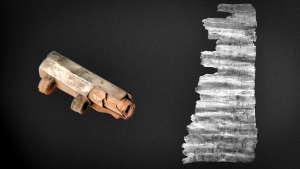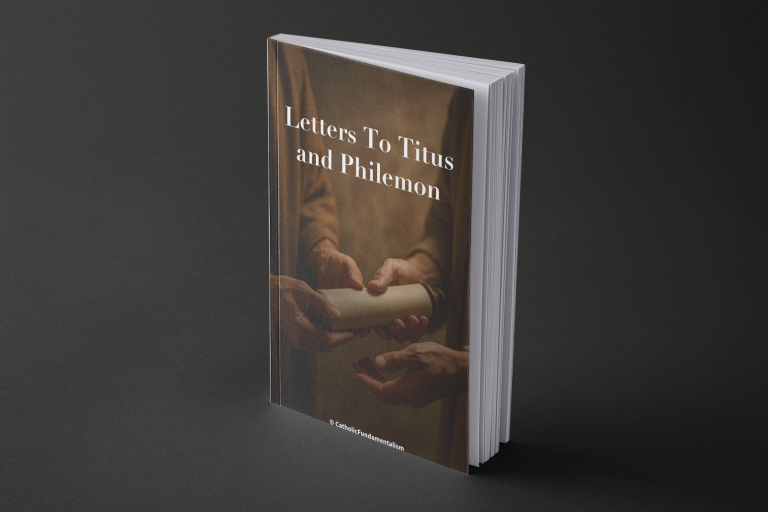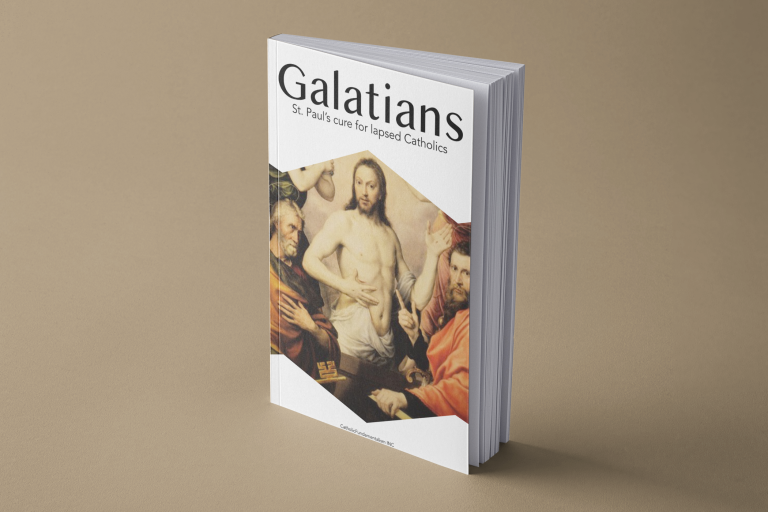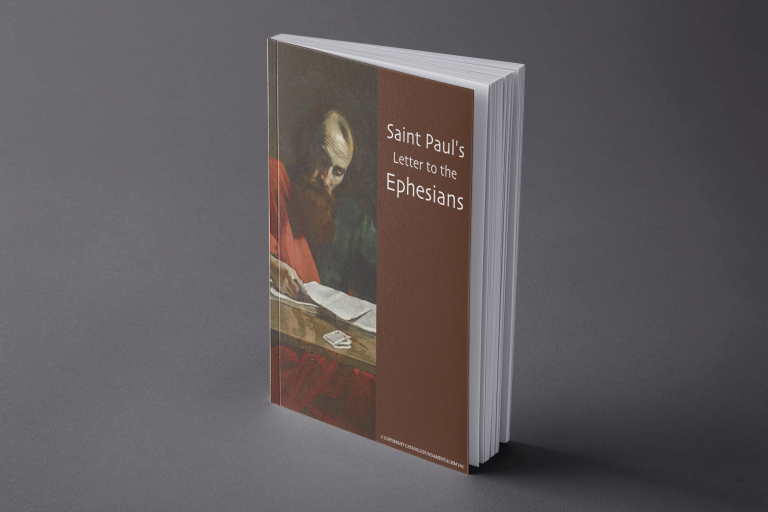Chapter 1: Faithful Partnership in the Gospel
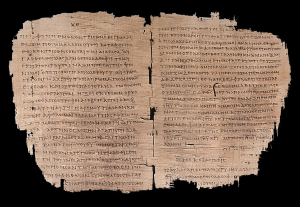
Oldest Surviving Pauline Codex
This bifolio features excerpts from Paul’s Letter to the Romans, the conclusion of Philippians, and the beginning of Colossians (Romans 11:13-22; 11:24-33; Philippians 4:14-Colossians 1:2; Colossians 1:5-13). It is part of a codex containing the Pauline Epistles, written in Greek on papyrus. Dating back to around 200 AD and originating from Egypt, this manuscript is the oldest nearly complete collection of Paul’s Epistles.
1. Paul and Timothy, slaves of Christ Jesus,
(It may be hard for Catholics to identify themselves as ‘slaves’ to Jesus Christ, but it is possible for all who respect The Church-Creating Word of Jesus to His First Catholic Pope:
‘And I say unto you thou art Peter and on this rock I build My Church and the gates of hell shall not prevail against it. I give you the keys to The Kingdom of Heaven.’
But that ‘slavery’ allows us to see the joy of obeying Every Word of Jesus that allowed Paul and Timothy to say: ‘to all the holy ones in Christ Jesus who are in Philippi, with the overseers and ministers.’
Catholics may think of themselves as ‘slaves’ of the ‘slaves’.)
2. Grace to you and peace from God our Father and the Lord Jesus Christ.
(The more obedient we are, the more “grace” and “peace” we have, and the more thankful we become to Jesus.)
3. I give thanks to my God at every remembrance of you,
(Paul thinks of those who have been blessed to be Catholic instead of himself.)
4. Praying always with joy in my every prayer for all of you,
(His prayer takes form in having “joy” added to our “grace” and “peace” in God’s Divine Arithmetic.)
5. Because of your partnership for the gospel from the first day until now.
(Lydia and others had become “slaves” the first time St. Paul told them about Jesus.)
6. I am confident of this, that the one who began a good work in you will continue to complete it until the day of Christ Jesus.
(Paul tells us that He Who arranged for Catholics to become Catholics is “The One” Who will continue His “good work” until The Judgment Day of Jesus Christ.)
7. It is right that I should think this way about all of you, because I hold you in my heart, you who are all partners with me in grace, both in my imprisonment and in the defense and confirmation of The Gospel.
(“Partners” fall into types of “slavery” by “imprisonment, defense, and confirmation of The Gospel.”)
8. For God is my witness, how I long for all of you with the affection of Christ Jesus.
9. And this is my prayer: that your love may increase ever more and more in knowledge and every kind of perception,
(“Every kind of perception” means that every human sense is able to take in The Glory of God.)
10. To discern what is of value, so that you may be pure and blameless for the day of Christ,
(May we not be confused by things of less “value” to our soul than the purity that is “blameless.”)
11. Filled with the fruit of righteousness that comes through Jesus Christ for the glory and praise of God.
(His “righteousness” is being “right”!)
Chapter 2: A Plea for Unity and Humility

El Greco – Christ Carrying the Cross
1. If there is any encouragement in Christ, any solace in love, any participation in the Spirit, any compassion and mercy,
(St. Paul appeals to the shared blessings of faith in Christ to inspire unity among the faithful.)
2. complete my joy by being of the same mind, with the same love, united in heart, thinking one thing.
(St. Paul emphasizes that division among believers separates them from the Body of Christ and its purpose.)
3. Do nothing out of selfishness or out of vainglory; rather, humbly regard others as more important than yourselves.
(‘Humility’ is the foundation of Christian behavior, replacing ‘selfishness’ and ‘pride’.)
4. Each looking out not for his own interests, but everyone for those of others.
(‘Selflessness’ aligns with Christ’s teachings, fostering love and unity.)
5. Have among yourselves the same attitude that is also yours in Christ Jesus,
(St. Paul encourages believers to model their lives after Christ’s humility and love.)
6. Who, though He was in the form of God, did not regard equality with God something to be grasped.
(Jesus, in His divinity, did not cling to His status but chose humility.)
7. Rather, He emptied Himself, taking the form of a slave, coming in human likeness; and found human in appearance,
(Christ’s ultimate act of humility was becoming fully human to save humanity.)
8. He humbled Himself, becoming obedient to death, even death on a cross.
(Jesus’ obedience to the will of God exemplifies the ultimate sacrifice for love and redemption.)
9. Because of this, God greatly exalted Him and bestowed on Him the name that is above every name,
(In response to Christ’s humility, God glorified Him above all.)
10. That at the name of Jesus every knee should bend, of those in heaven and on earth and under the earth,
11. And every tongue confess that Jesus Christ is Lord, to the glory of God the Father.
(This hymn celebrates Christ’s universal lordship and the worship He rightly deserves.)
12. So then, my beloved, obedient as you have always been, not only when I am present but all the more now when I am absent, work out your salvation with fear and trembling.
(St. Paul reminds the faithful to live in awe of God, striving for holiness in all circumstances.)
13. For God is the one who, for His good purpose, works in you both to desire and to work.
(God provides both the will and the means for believers to fulfill His purpose.)
14. Do everything without grumbling or questioning,
(Obedience without complaint reflects trust and humility before God.)
15. That you may be blameless and innocent, children of God without blemish in the midst of a crooked and perverse generation, among whom you shine like lights in the world,
(Believers are called to be examples of holiness and righteousness, standing out in a world of sin.)
16. As you hold on to the word of life, so that my boast for the day of Christ may be that I did not run in vain or labor in vain.
(St. Paul’s ministry is fulfilled when believers remain steadfast in faith.)
17. But, even if I am poured out as a libation upon the sacrificial service of your faith, I rejoice and share my joy with all of you.
(Paul views his suffering as a part of his service to God and the faith of others.)
18. In the same way, you also should rejoice and share your joy with me.
(Rejoicing in faith and service brings believers closer to God and one another.)
Chapter 3: Pressing Onward to the Goal

Caravaggio – La conversione di San Paolo
1. Finally, my brothers, rejoice in the Lord. Writing the same things to you is no burden for me but is a safeguard for you.
(St. Paul emphasizes the importance of joy in faith and repetition as a means of strengthening the faithful.)
2. Beware of the dogs! Beware of the evil workers! Beware of the mutilation!
(A warning against false teachers who place importance on external rituals over faith.)
3. For we are the circumcision, we who worship through the Spirit of God, who boast in Christ Jesus and do not put our confidence in flesh,
(True believers are identified by their worship in spirit, not by outward signs.)
4. Although I myself have grounds for confidence even in the flesh.
(Paul acknowledges his earthly credentials but explains their futility compared to faith.)
5. Circumcised on the eighth day, of the race of Israel, of the tribe of Benjamin, a Hebrew of Hebrew parentage, in observance of the law a Pharisee,
6. In zeal I persecuted the church, in righteousness based on the law I was blameless.
(Paul recounts his credentials under the law to show their ultimate insignificance.)
7. But whatever gains I had, these I have come to consider a loss because of Christ.
(Paul rejects his former achievements, valuing Christ above all.)
8. More than that, I even consider everything as a loss because of the supreme good of knowing Christ Jesus my Lord.
(Knowing Christ surpasses all earthly achievements.)
9. For His sake, I have accepted the loss of all things and I consider them so much rubbish, that I may gain Christ
(Paul regards worldly gains as meaningless compared to the richness of faith in Christ.)
10. And be found in Him, not having any righteousness of my own based on the law but that which comes through faith in Christ, the righteousness from God, depending on faith,
11. To know Him and the power of His resurrection and the sharing of His sufferings by being conformed to His death,
(Paul aspires to deeper fellowship with Christ through ‘faith’ and ‘suffering’.)
12. If somehow I may attain the resurrection from the dead.
(Paul’s ultimate goal, for himself and us, is eternal life with Christ.)
13. It is not that I have already taken hold of it or have already attained perfect maturity, but I continue my pursuit in hope that I may possess it, since I have indeed been taken possession of by Christ Jesus.
(Paul acknowledges his ongoing spiritual journey, striving for perfection in Christ.)
14. Brothers, I for my part do not consider myself to have taken possession. Just one thing: forgetting what lies behind but straining forward to what lies ahead,
(Paul focuses on the future, not dwelling on past achievements or failures.)
15. I continue my pursuit toward the goal, the prize of God’s upward calling, in Christ Jesus.
(Paul’s life is centered on reaching the ultimate reward of eternal life.)
16. Let us, then, who are “perfectly mature” adopt this attitude. And if you have a different attitude, this too God will reveal to you.
(Paul encourages unity and openness to God’s guidance.)
17. Only, with regard to what we have attained, continue on the same course.
(Paul urges believers to remain steadfast in their faith.)
18. Join with others in being imitators of me, brothers, and observe those who thus conduct themselves according to the model you have in us.
(Paul encourages believers to follow his example and the example of others who live faithfully.)
19. For many, as I have often told you and now tell you even in tears, conduct themselves as enemies of the cross of Christ.
(Paul laments those who reject Christ and His teachings.)
20. Their end is destruction. Their God is their stomach; their glory is in their “shame.” Their minds are occupied with earthly things.
(Paul warns against those who prioritize earthly desires over spiritual truths.)
21. But our citizenship is in heaven, and from it we also await a savior, the Lord Jesus Christ.
22. He will change our lowly body to conform with His glorified body by the power that enables Him also to bring all things into subjection to Himself.
(Christ will transform believers, preparing them for eternal life.)
Chapter 4: Rejoice and Remain Faithful!

Rembrandt van Rijn – Saint Paul
1. So then, my brothers and sisters, whom I love and long for, my joy and crown, in this way stand firm in the Lord, beloved.
(Paul expresses his deep affection for the believers and encourages them to remain ‘steadfast’ in their ‘faith.’)
2. I urge Euodia and I urge Syntyche to come to a mutual understanding in the Lord.
(Paul calls for unity and reconciliation among two disagreeing members of the church.)
3. Yes, and I ask you also, my true yokemate, to help them, for they have struggled at my side in promoting the gospel, along with Clement and my other co-workers, whose names are in the book of life.
(Paul highlights the importance of cooperation in resolving conflicts for the sake of the gospel.)
4. Rejoice in the Lord always. I shall say it again: rejoice!
(Paul commands the faithful to find constant joy in their relationship with the Lord.)
5. Your kindness should be known to all. The Lord is near.
(Paul encourages believers to exhibit ‘kindness’, as the Lord’s return is ‘imminent’.)
6. Have no anxiety at all, but in everything, by prayer and petition, with thanksgiving, make your requests known to God.
(Paul reminds believers to entrust their worries to God through prayer and gratitude.)
7. Then the peace of God that surpasses all understanding will guard your hearts and minds in Christ Jesus.
(Trusting God brings a ‘peace‘ that transcends human comprehension.)
8. Finally, brothers, whatever is true, whatever is honorable, whatever is just, whatever is pure, whatever is lovely, whatever is gracious, if there is any excellence and if there is anything worthy of praise, think about these things.
(Paul advises focusing on ‘virtuous‘ and ‘praiseworthy’ thoughts to cultivate a Christ-like mindset.)
9. Keep on doing what you have learned and received and heard and seen in me. Then the God of peace will be with you.
(Paul encourages believers to practice what he has taught them, assuring them of God’s presence.)
(Gratitude for the Philippians’ Generosity)
10. I rejoice greatly in the Lord that now at last you revived your concern for me. You were, of course, concerned about me but lacked an opportunity.
(Paul expresses gratitude for the Philippians’ renewed support.)
11. Not that I say this because of need, for I have learned, in whatever situation I find myself, to be self-sufficient.
(Paul shares his contentment in God’s provision, regardless of his circumstances.)
12. I know indeed how to live in humble circumstances; I know also how to live with abundance. In every circumstance and in all things I have learned the secret of being well fed and of going hungry, of living in abundance and of being in need.
(Paul reveals his ability to find peace and satisfaction through faith in all situations.)
13. I have the strength for everything through Him who empowers me.
(Paul acknowledges that his ‘strength‘ comes from God.)
14. Still, it was kind of you to share in my distress.
(Paul appreciates their generosity and empathy.)
15. You Philippians indeed know that at the beginning of the gospel, when I left Macedonia, not a single church shared with me in an account of giving and receiving, except you alone.
(Paul highlights the Philippians’ ‘very unique role’ in supporting his ministry.)
16. For even when I was at Thessalonica you sent me something for my needs, not only once but more than once.
(Paul recalls their consistent generosity in meeting his needs.)
17. It is not that I am eager for the gift; rather, I am eager for the profit that accrues to your account.
(Paul values the spiritual blessings that their generosity brings to themselves more than the material support for him.)
18. I have received full payment and I abound. I am very well supplied because of what I received from you through Epaphroditus, “a fragrant aroma,” an acceptable sacrifice, pleasing to God.
(Paul considers their gift a holy and pleasing offering to God.)
19. My God will fully supply whatever you need, in accord with His glorious riches in Christ Jesus.
(Paul assures them that God will meet all their needs.)
20. To our God and Father, glory forever and ever. Amen.
(Paul concludes with praise to God.)
(Final Greetings)
21. Give my greetings to every holy one in Christ Jesus. The brothers who are with me send you their greetings.
(Paul sends his greetings to the Philippians and includes those with him.)
22. All the holy ones send you their greetings, especially those of Caesar’s household.
(Paul notes that even members of Caesar’s household have embraced the ‘faith’.)
23. The grace of the Lord Jesus Christ be with your spirit.
(Paul closes with a final blessing for the Philippians.)
Afterword
Concluding Thoughts
‘You are my friends, if you obey my commands.’ John: 15-14
‘The grace of the lord Jesus Christ’ Philippians: 4-23
Every “Letter of St. Paul” tells us what we need to save our soul. May we all strive to have this Word of God:
“You are My friends if you obey My commands.”
Guide us on the way to our judgment, so that:
“The grace of The Lord Jesus Christ be with our spirit.”
May all be blessed to have obedient respect for the Church-Creating Word of He Who fulfilled the prophecies in Matthew 16:18-20:
“And I say unto you, thou art Peter, and on this rock, I build My Church, and the gates of hell shall not prevail against it. I give you the keys to the Kingdom of Heaven.” John: 16-18
There is no “The End.”


